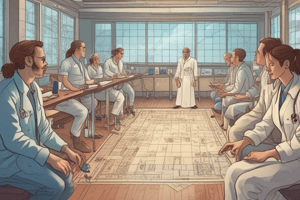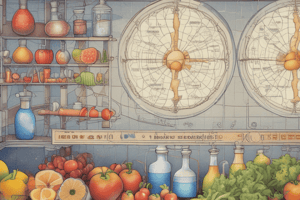Podcast
Questions and Answers
What is the primary basis for scientific understanding?
What is the primary basis for scientific understanding?
- Historical data and anecdotes
- Personal beliefs and feelings
- Information derived from observations of nature (correct)
- Cultural interpretations of phenomena
Which of the following best describes the nature of inferences in scientific reasoning?
Which of the following best describes the nature of inferences in scientific reasoning?
- They require no evidence or observation.
- They are logical conclusions derived from observable facts. (correct)
- They are solely based on personal intuition.
- They primarily rest on untested hypotheses.
How do scientific claims gain validity?
How do scientific claims gain validity?
- By being popularized in media
- Based on historical consensus
- Through testing against observations of the natural world (correct)
- By matching common beliefs
What differentiates scientific explanations from non-scientific ideas?
What differentiates scientific explanations from non-scientific ideas?
What role does mathematics play in scientific endeavors?
What role does mathematics play in scientific endeavors?
Which statement about hallucinations and dreams in relation to science is correct?
Which statement about hallucinations and dreams in relation to science is correct?
What is a characteristic of scientific methods?
What is a characteristic of scientific methods?
What is essential for understanding biological evolution through a scientific lens?
What is essential for understanding biological evolution through a scientific lens?
What characterizes scientific conclusions?
What characterizes scientific conclusions?
What is a key feature of science that distinguishes it from democracy?
What is a key feature of science that distinguishes it from democracy?
What does it mean to say that science is non-dogmatic?
What does it mean to say that science is non-dogmatic?
Which of the following accurately reflects a limitation of science?
Which of the following accurately reflects a limitation of science?
How does science correct itself over time?
How does science correct itself over time?
What does it mean when a hypothesis is tested and consistently confirmed?
What does it mean when a hypothesis is tested and consistently confirmed?
What does the term 'spontaneous generation' refer to in a scientific context?
What does the term 'spontaneous generation' refer to in a scientific context?
Which of the following is NOT a step in the scientific method?
Which of the following is NOT a step in the scientific method?
What essence does the term 'techne' in the context of science convey?
What essence does the term 'techne' in the context of science convey?
In scientific practice, what does ongoing scrutiny signify?
In scientific practice, what does ongoing scrutiny signify?
In the context of scientific investigation, what does the term 'theory' imply?
In the context of scientific investigation, what does the term 'theory' imply?
What is the simplest form of technology?
What is the simplest form of technology?
How do scientists primarily determine if their investigations are scientifically valid?
How do scientists primarily determine if their investigations are scientifically valid?
Which statement best describes a common way scientists communicate their findings?
Which statement best describes a common way scientists communicate their findings?
Which of the following technologies has NOT been mentioned as influential in enhancing communication?
Which of the following technologies has NOT been mentioned as influential in enhancing communication?
What negative effect does technological development often produce?
What negative effect does technological development often produce?
Why is non-science defined as such?
Why is non-science defined as such?
Which of the following is NOT considered a source of bias in pseudoscience?
Which of the following is NOT considered a source of bias in pseudoscience?
Innovations in technology have contributed to which of the following societal changes?
Innovations in technology have contributed to which of the following societal changes?
What type of knowledge does not fall within the realm of science?
What type of knowledge does not fall within the realm of science?
Which characteristic defines pseudoscience?
Which characteristic defines pseudoscience?
Flashcards are hidden until you start studying
Study Notes
Science and Understanding
- Science seeks to explain the natural world using evidence gathered from our senses and their extensions
- Scientific ideas are developed through logical reasoning, drawing conclusions based on observable facts
- Scientific claims are tested through repeated experiments and observations, and are either rejected, modified, or accepted based on the evidence
- Science is always evolving and conclusions are always tentative, open to scrutiny and modification as new evidence appears
- Science is not a democracy – ideas are accepted or rejected solely based on evidence, not on popularity
- Science is non-dogmatic – explanations and conclusions are only accepted if they are well-founded and continue to withstand scrutiny
- Science cannot make moral or aesthetic decisions – it can describe relationships but not assert personal preferences, while scientists, like everyone, still make personal judgments outside of science
- Science is not always linear – some theories once accepted may later be found to be inaccurate or incomplete, as our understanding progresses over time
- Science corrects itself – errors are identified and rectified over time with advancements in technology, perspectives, and understanding
Technology
- Technology is the application of scientific knowledge for practical purposes – usually for industry and improving the human condition
- Technology encompasses techniques, skills, methods, and processes used to produce goods, services, or achieve objectives
- Basic tools, the control of fire, the wheel, the printing press, the telephone, and the Internet are examples of technology that have shaped human society
- Technology has advanced economies, enabled global communication, and increased leisure, but also created pollution and depleted resources
- Innovations often impact societal values and raise ethical questions, like efficiency and bioethics
Non-Science and Pseudoscience
- Non-science refers to areas of knowledge that do not adhere to scientific criteria like consistency, observability, testability, and predictability
- Non-science encompasses areas of knowledge that are logical, but not within the realm of science, such as belief systems, philosophy, opinions, aesthetics, or ethics
- Pseudoscience presents itself as scientific, but lacks valid scientific methodology, supporting evidence, or testability
- It often utilizes vague, exaggerated, or unprovable claims, relies on confirmation bias rather than refutation, and lacks openness to rational development of theories
Scientific Method and Inquiry
- Across scientific disciplines, evidence, hypotheses, theories, and logic are fundamental
- Scientists may investigate different phenomena and employ diverse approaches, but share an understanding of what constitutes a valid scientific investigation
- Scientific inquiry is driven by curiosity and acceptance of explanations based on evidence and proof
- The scientific method is a structured approach for proving hypotheses, consisting of:
- Stating the problem
- Forming a hypothesis
- Testing the hypothesis
- Recording and analyzing data
- Forming a conclusion
- Replicating the work
- When a hypothesis is repeatedly tested and confirmed, and is unlikely to be disproven, it may become a theory
- Theories are time-tested concepts that offer reliable and useful predictions about the natural world
- Common sense and logic can also explain events or phenomena, not everything requires an experiment
Studying That Suits You
Use AI to generate personalized quizzes and flashcards to suit your learning preferences.




